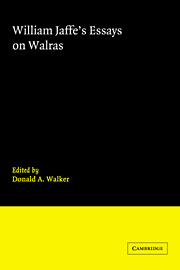Book contents
- Frontmatter
- Contents
- Preface
- Acknowledgments
- Introduction
- PART I WALRAS'S BIOGRAPHY
- PART II THE GENESIS AND DEVELOPMENT OF WALRAS'S IDEAS
- PART III THE SCOPE OF WALRAS'S WORK
- PART IV SPECIAL TOPICS IN WALRAS'S ECONOMICS
- PART V WALRAS'S PLACE IN THE HISTORY OF ECONOMIC THOUGHT
- 15 Reflections on the importance of Léon Walras (1971)
- 16 Léon Walras's role in the “marginal revolution” of the 1870s (1972)
- 17 Menger, Jevons and Walras de-homogenized (1976)
- 18 The normative bias of the Walrasian model: Walras versus Gossen (1977)
- 19 Walras's economics as others see it (1980)
- Index
18 - The normative bias of the Walrasian model: Walras versus Gossen (1977)
Published online by Cambridge University Press: 05 May 2010
- Frontmatter
- Contents
- Preface
- Acknowledgments
- Introduction
- PART I WALRAS'S BIOGRAPHY
- PART II THE GENESIS AND DEVELOPMENT OF WALRAS'S IDEAS
- PART III THE SCOPE OF WALRAS'S WORK
- PART IV SPECIAL TOPICS IN WALRAS'S ECONOMICS
- PART V WALRAS'S PLACE IN THE HISTORY OF ECONOMIC THOUGHT
- 15 Reflections on the importance of Léon Walras (1971)
- 16 Léon Walras's role in the “marginal revolution” of the 1870s (1972)
- 17 Menger, Jevons and Walras de-homogenized (1976)
- 18 The normative bias of the Walrasian model: Walras versus Gossen (1977)
- 19 Walras's economics as others see it (1980)
- Index
Summary
Though Walras's Eléments d'économie politique pure is couched in the language of pure theory and appears, on the surface, as a completely wert-frei synoptic view of the interdependent operations of an economic system under a hypothetical regime of perfectly free competition, nevertheless the implicit moral convictions that inform the model occasionally show through—nowhere better than in Walras's theorem of maximum social satisfaction. I propose, therefore, to concentrate my attention on that theorem: showing in the first part how, for want of proper attention to Walras's moral bias, the theorem came to be misunderstood by Walras's most eminent critics, and, in the second part, how this bias was brought out into the open in Walras's analysis of Gossen's theory of maximum subjective gain from trade.
A common complaint against Léon Walras is that he misconceived the maximization of social satisfaction. A good example of this complaint appears in William Baumol's Welfare Economics and the Theory of the State, where we are told:
One of the most unfortunate bits of circular reasoning in the history of the discussion of our problem is found throughout Léon Walras's otherwise invaluable works. … [His] argument is the standard one, that given the price of any two commodities, the best any consumer can do for himself is to buy these commodities in such proportion that the ratio between their marginal utilities to him is equal to the ratio of their prices. […]
- Type
- Chapter
- Information
- William Jaffe's Essays on Walras , pp. 326 - 342Publisher: Cambridge University PressPrint publication year: 1983
- 1
- Cited by



